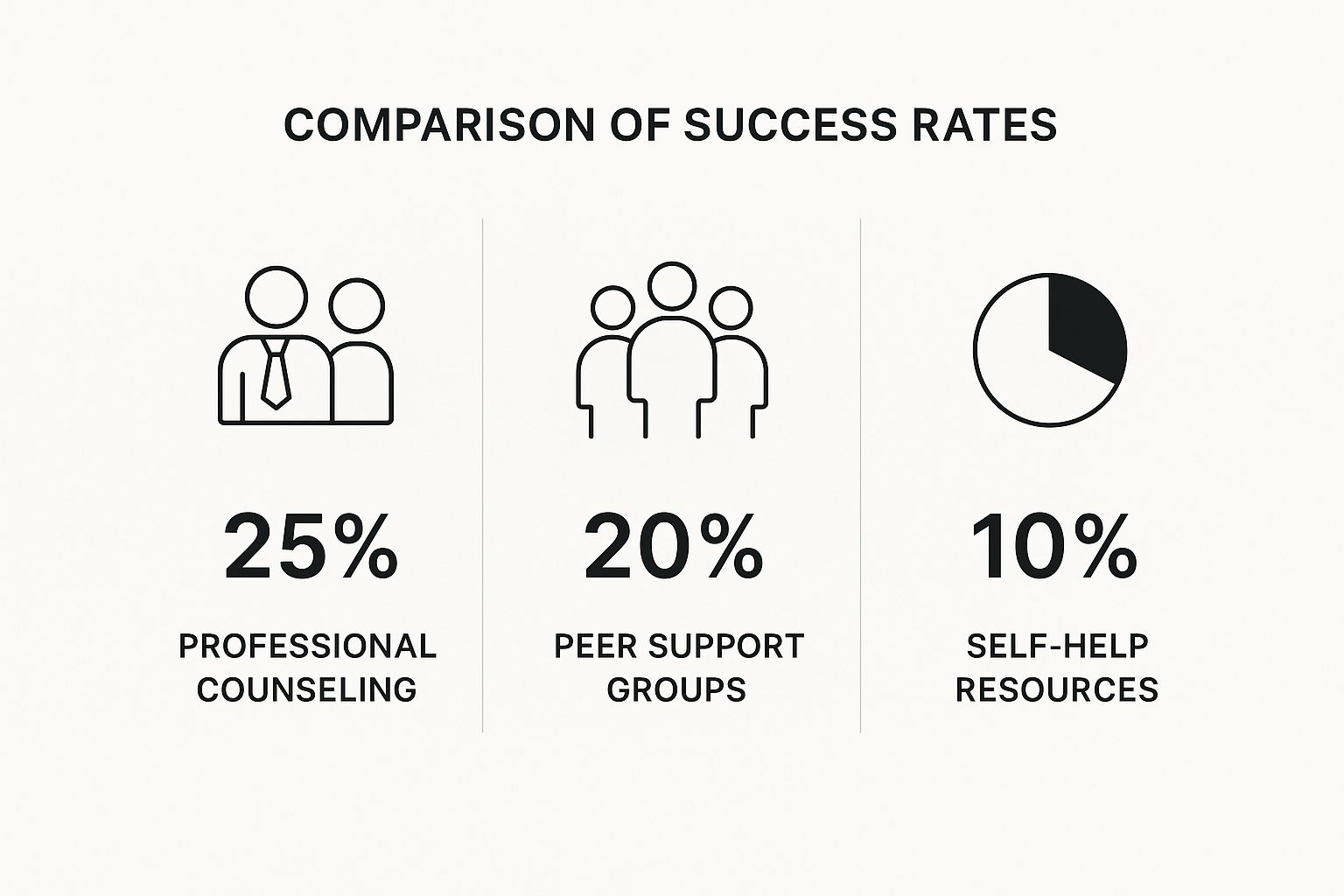When someone you care about is trying to quit smoking, your first instinct might be to take charge. But what they really need is patience and understanding, not pressure. Your job isn't to manage their journey, but to be their most steadfast ally, offering encouragement and celebrating the small wins along the way.
Quitting is a process, often a messy one, and your non-judgemental support is one of the most powerful tools they have.
Your Role in Their Quitting Journey

It’s completely normal to feel a bit helpless watching someone you love struggle with smoking. The urge to jump in with lectures and unsolicited advice is strong, but the most effective support you can offer often starts with just listening.
Nicotine addiction is a complex beast. It physically rewires the brain, tangling the act of smoking up with daily routines, stress relief, and even moments of pleasure. This makes quitting about so much more than sheer willpower.
Getting your head around this is the first crucial step. It helps shift your perspective from frustration to real empathy. Your role isn't to force them to quit or to drill them on the dangers—trust me, they know the risks. Instead, your goal is to create a safe, supportive space where they feel empowered to make their own choices.
Become Their Biggest Supporter
Think of yourself as their cheerleader, not their coach. Your main job is to offer positive reinforcement and listen without jumping to conclusions. This means focusing on their efforts, no matter how small they might seem.
- Celebrate the small wins: Did they get through a whole day without a cigarette? Acknowledge it. Did they resist a major craving during a stressful meeting? Praise their strength. These little victories are huge.
- Practise active listening: When they open up about their struggles, just listen. Don't immediately jump in with solutions. Sometimes, all they need is to voice their frustrations out loud to someone who gets it.
- Offer practical help: Simply ask, "What can I do to help?" It could be anything from providing a distraction when a craving hits to just being on the end of the phone when things get tough.
At its core, quitting smoking is about breaking a deeply ingrained habit. Learning how to break bad habits means spotting triggers and swapping old routines for new, healthier ones. Your support can be a massive part of building that new foundation.
Understand the Bigger Picture
Helping someone quit is a big deal, especially when you look at the scale of the issue. Here in the UK, smoking rates have dropped massively since the 1960s, but it remains a serious public health challenge.
Despite all the progress, smoking is still responsible for an estimated 80,000 deaths every year in the UK. Half of all long-term smokers will die from a related illness. The support you're giving is part of a much larger effort to change those numbers for the better.
Remember: Setbacks are part of the process, not a sign of failure. If they have a slip-up, the most important thing you can do is remind them how far they've come and encourage them to try again tomorrow. Your consistent, compassionate support is what truly helps someone quit for good.
How to Start the Quitting Conversation

Bringing up smoking can feel like walking on eggshells. You’re coming from a place of love, but you’re terrified of starting a fight or pushing them away. Let me be clear: your timing and your tone are absolutely everything here.
Wait for a moment when you’re both relaxed and won't be interrupted. A tense, rushed chat in the middle of a stressful day is a recipe for disaster. Think about a quiet moment after dinner, during a walk, or on a lazy weekend afternoon. Your goal is to create a feeling of partnership, not confrontation, right from the start.
When you do bring it up, lead with how you feel. Using "I" statements is a game-changer. It makes it clear this is about your concern for their well-being, not a lecture about their choices. It shifts the entire dynamic from blame to care.
Choosing the Right Words
The phrases you use can either build a bridge or put up a wall. You want to avoid anything that sounds accusatory and instead use words that invite them to open up. Remember, this isn't a lecture. It's just a conversation starter to show you're on their side.
Here are a few gentle ways to open that door:
- "I've been thinking about you, and I’m a bit worried about that cough you've had lately. How have you been feeling?" This centres your concern on their health, using a specific, gentle observation.
- "I know we don’t talk about this much, but if you ever decided you wanted to quit smoking, I’d be here to help in any way I can." This is a really low-pressure offer. It gives them all the power and lets them know you're a safe person to turn to.
- "I was reading about how much money people save when they stop smoking, and it made me think of you. Have you ever thought about what you’d do with that extra cash?" This frames quitting around a positive benefit—something to gain, not just something to lose.
Your aim is simply to plant a seed. You’re just letting them know you’re there for them when, or if, they feel ready.
Defensiveness is a common and totally understandable reaction. If they shut down or get annoyed, don't push it. Simply say, "Okay, I understand. I just want you to know I care and I'm here for you," and then change the subject.
Navigating Their Reaction
Their response will tell you everything you need to know about where their head is at. If they seem open to talking, you can gently ask a few more questions. Something like, "Have you ever tried to quit before?" or "Is there anything that makes you want to stop?" can encourage them to reflect without feeling cornered.
If they get defensive, that’s your signal to back off immediately. Pushing any harder will only create resentment and make them less likely to come to you for support down the line. Respect their feelings and give them space. You’ve already done the most important thing: you’ve shown you care. That message will stick with them long after the conversation ends, laying the foundation to help someone quit smoking for good.
Finding the Right Quitting Aids Together
Once the conversation is open and they feel ready to take the next step, your practical support becomes absolutely crucial. Let’s be honest, the sheer number of quitting aids out there can feel overwhelming for anyone, let alone someone already dealing with the stress of quitting.
This is where you can make a real difference. By helping them explore the options, you turn a daunting task into a shared project. Your role can be as simple as being the researcher, the appointment-booker, or just the cheerleader on the sidelines. Offering to sit down together and look up local NHS Stop Smoking Services, or suggesting a trip to the pharmacy to chat about Nicotine Replacement Therapy (NRT), shows you’re truly in their corner.
Exploring the Main Pathways to Quitting
In the UK, we're fortunate to have a wealth of support available, but many people simply don't know where to begin. You can help cut through the noise by breaking it down into a few main categories.
Most quitting methods fall into one of these buckets:
- Professional Support: This is the gold standard, really. Think NHS services and GP consultations, where they can get structured advice and even prescription medications like Varenicline.
- Nicotine Replacement (NRT): These are the classic over-the-counter options. Patches, gum, lozenges—they all work by giving a controlled dose of nicotine to manage withdrawal, without all the other nasty chemicals in cigarettes.
- Alternative Aids: This is a broad category that includes everything from vaping and e-cigarettes to non-nicotine options designed to tackle the physical habit itself.
This infographic really puts it into perspective, showing just how much of a difference professional guidance can make.

The data is pretty clear: getting structured support can more than double their chances of success compared to going it alone.
What About Vaping and E-Cigarettes?
You can't talk about quitting smoking these days without mentioning vaping. It’s become a huge tool for countless people, and it's important to understand where it fits in.
Recent long-term research in England has shown just how effective e-cigarettes can be. A major study found that vaping was used in a massive 40.2% of quit attempts between 2023-2024. Not only that, it was the most successful aid.
What's really surprising, though, is that other proven methods like prescription NRT were used in less than 5% of attempts. It just goes to show that many smokers aren't aware of all the highly effective options available to them.
Comparing Common UK Smoking Cessation Aids
To make things a bit clearer, let's look at the most common methods available here in the UK. Each has its own way of working and suits different types of people and habits.
| Method | How It Works | Where to Get It | Best For Someone Who... |
|---|---|---|---|
| Nicotine Patches | Delivers a steady, slow release of nicotine through the skin to ease withdrawal symptoms. | Pharmacies, supermarkets, or on prescription from a GP. | ...prefers a "set it and forget it" approach and has a regular smoking pattern. |
| Nicotine Gum/Lozenges | Provides a quick nicotine hit to manage sudden, intense cravings. | Pharmacies, supermarkets, or on prescription. | ...needs fast-acting relief for unpredictable cravings throughout the day. |
| Vaping/E-Cigarettes | Replaces the hand-to-mouth action and provides nicotine without tobacco smoke. | Specialist vape shops, online, and some retailers. | ...finds the physical ritual of smoking the hardest part to give up. |
| Prescription Medication | Drugs like Varenicline (Champix) work by reducing cravings and blocking the rewarding effects of nicotine. | Prescription only, from a GP or NHS Stop Smoking Service. | ...has tried other methods without success and needs stronger medical support. |
| Behavioural Support | One-on-one or group counselling from trained advisors to tackle the psychological side of addiction. | Local NHS Stop Smoking Services. | ...benefits from accountability, structured support, and talking through challenges. |
Seeing it all laid out like this can help you both figure out which path, or combination of paths, might be the best fit.
Practical Steps You Can Take Together
Your support is about more than just talking. Offering to take concrete action can be the push they need to get started and keep going.
Your offer to help with the practical side of things—like making a phone call or driving them to an appointment—can lift a huge mental weight. It’s a simple gesture that says, "You don't have to figure this out alone."
Here are a few simple, actionable things you can do as a team:
- Do the Research: Set aside an evening to look up local NHS Stop Smoking services online or read reviews of different NRT products.
- Book the Appointment: For some, the simple act of scheduling a GP visit is a huge barrier. Offering to make the call can get the ball rolling.
- Explore Natural Alternatives: If they want to avoid nicotine altogether, you can explore other avenues. Our guide on how to quit smoking naturally is a great place to start looking for ideas.
- Go Shopping with Them: A trip to the pharmacy to pick up patches or gum feels a lot less intimidating when you have a friend by your side.
By tackling these small steps together, you reinforce your support and make the entire process feel far more manageable and much less lonely.
Navigating Daily Triggers and Cravings

Once their quit date has passed, that initial rush of motivation can start to wear off. It’s often replaced by the day-to-day reality of managing cravings, and this is where your support becomes absolutely crucial. The real battle isn't just about willpower; it’s about carefully dismantling the small, powerful habits that have been tangled up with smoking for years.
A trigger is any situation, feeling, or routine that the brain has learned to link with lighting up. It could be that first cup of coffee in the morning, finishing a lovely meal, or a stressful phone call at work. These moments can spark intense cravings that feel almost automatic.
Your role here is to help them identify these personal triggers and brainstorm practical alternatives together. This isn't about banning coffee or avoiding friends; it's about breaking the association. Think of it as proactive teamwork.
Identifying and Replacing Key Triggers
First things first, you need to become a bit of a detective. Help them pinpoint the exact moments they feel that powerful urge to smoke. Is it always on their drive home? Or maybe when they have a drink with mates? Once you know what you're up against, you can make a plan.
Here are some of the most common triggers and a few simple swaps you can suggest:
- Morning Coffee: If a cigarette has always been their coffee's best friend, it's time to shake up the routine. They could try drinking their coffee in a different room, switching to tea for a week, or even going for a quick walk together right after their first cup.
- Stressful Moments: Stress is a massive one for almost everyone. When they feel overwhelmed, instead of reaching for a smoke, suggest a different kind of circuit-breaker. Deep breathing is incredibly effective for calming the nervous system. You could even explore some simple breathing exercises for anxiety together.
- Post-Meal Craving: That after-dinner cigarette can be a really stubborn habit to break. The key is to have a distraction ready to go immediately. Suggest washing the dishes together, watching a short comedy clip, or calling a friend for a quick chat.
- Social Situations: If socialising and smoking go hand-in-hand for them, it might be a good idea to suggest some smoke-free activities for a little while. Think about going to the cinema, trying a new restaurant with a strict no-smoking policy, or visiting a museum.
Remember, the goal is to replace the old habit with a new, healthier one. Having a ready-made list of distractions and alternatives makes it so much easier to get through a craving when it strikes.
Providing Emotional Backup During Withdrawal
Those first couple of weeks are often the toughest, no doubt about it. Nicotine withdrawal can cause some very real physical and emotional symptoms, like irritability, low mood, and anxiety. They might be snappy or seem a bit down—it’s not personal, it's just the addiction leaving their system.
During this time, your patience is your superpower. Offer them grace and understanding. Acknowledge how hard they're working by saying something like, "I know this is really difficult right now, and you're doing an amazing job just getting through today."
Offering distractions that engage their other senses can also be a massive help. The need for that hand-to-mouth action, or oral fixation, is common. Having healthy snacks on hand like crunchy carrots, sunflower seeds, or sugar-free gum can make a huge difference. By being there for them, you provide the stability they need to get through these turbulent early days and start building new habits that will last a lifetime.
Responding to a Relapse with Compassion
Watching someone you care about have a cigarette after they've tried so hard to quit can feel incredibly disheartening. Your first instinct might be frustration or disappointment, but this is the moment your compassionate support matters most.
A slip-up isn't a failure. It’s a common, often predictable, part of the quitting process.
Treating it like a catastrophe can trigger feelings of shame and guilt—powerful triggers that often lead people to start smoking again. Instead, your goal is to frame it as a learning opportunity. This is a detour, not a dead end. Your calm, steady reaction can be the difference between them giving up and getting right back on track.
Frame It as a Learning Moment
When they’re ready to talk, approach the situation with curiosity, not criticism. The focus should be on understanding what happened so you can plan for it next time. Anger and disappointment will only make them feel worse and less likely to confide in you again.
Instead, try using gentle, non-judgemental phrases that show you're still on their team:
- "That's okay, this is all part of the process. What was going on when you felt the urge?" This validates their struggle and immediately shifts the focus to problem-solving.
- "Don't let one cigarette undo all your hard work. What can we do differently next time that trigger comes up?" This reinforces their progress and frames the situation as a team effort.
By helping them analyse the trigger—was it stress, a social situation, or just a moment of weakness?—you empower them to build a stronger defence for the future. It turns a negative moment into a valuable piece of data for their quitting journey.
Reinforce Their Commitment to Quitting
A relapse can really shake their confidence, making them feel like all their progress has been lost. It’s your job to remind them that this simply isn't true.
Every single hour they went without smoking was a victory that has already benefited their health. Remind them of how far they've come and, more importantly, why they wanted to quit in the first place.
A slip-up doesn't erase the progress made. It's a sign that the current strategy needs a small adjustment, not a complete overhaul. The most important thing is to get back to the plan without delay.
This might also be a good time to revisit the support systems available. Navigating quitting alone is incredibly tough. Data from English Stop Smoking Services consistently show that smokers who get specialist help are far more successful. Unaided quit attempts have a success rate of around 3-4%, but this jumps to 9.3% for those using dedicated services, effectively tripling their chances.
This just shows how powerful expert guidance can be when things get tough. You can discover more insights about the effectiveness of specialist support services to help someone quit smoking.
Your unconditional support in this critical moment reinforces your role as their most trusted ally. It keeps the long-term goal in sight and shows them that one mistake doesn't define their entire journey.
A Few Common Sticking Points
When you're helping someone quit, you're bound to run into a few tricky situations. It's completely normal. Knowing what to expect and having a few ideas up your sleeve can make all the difference, helping you stay supportive without getting drawn into an argument.
What If They Get Angry When I Mention Their Smoking?
This is a big one. You bring it up, trying to be helpful, and suddenly you're met with a wall of anger. It’s almost always a sign of defensiveness, usually coming from a place of shame or feeling like they're being told what to do.
The best move here is to gently back off. Don't push it.
Your goal is to de-escalate, not to win the argument. Try saying something like, "I can see this isn't a good time. I just want you to know I'm here for you if you ever want to talk." This simple sentence keeps the door wide open for another day, showing you're on their side, not on their case.
Should I Hide Their Lighters and Ashtrays?
It’s tempting, isn’t it? The logic seems simple: out of sight, out of mind. But taking matters into your own hands and hiding their smoking gear can seriously backfire. It can feel controlling and disrespectful, undermining their own sense of commitment.
A much better approach is to make it a team effort.
Frame it as a positive step in their plan. You could say, "As part of your fresh start, what do you think about us doing a clean sweep of all the smoking stuff together?" This turns it from a sneaky act into an empowering ritual—a joint decision to clear the way for a new, healthier chapter.
How Long Do the Worst Withdrawal Symptoms Last?
The physical side of quitting is no joke, and the first week is usually the toughest. The cravings, irritability, and anxiety tend to peak around the third day and then start to ease off after the first fortnight.
Your main job during this time is to be a source of patience and a master of distraction.
Remind them that this intense phase is temporary. A little reassurance goes a long way. Saying something as simple as, "You're doing an amazing job getting through the worst of it," can be incredibly powerful when they're in the thick of it.
Just remember, even after the physical symptoms fade, the psychological cravings can pop up for months. These are often tied to old habits and emotions, which is why your ongoing encouragement is so vital.
Is Switching to Vaping Actually Helping?
This is a really common question, and it makes sense to ask. According to the NHS and other UK health bodies, vaping is substantially less harmful than smoking. The real damage from tobacco comes from the tar and carbon monoxide, which e-cigarettes don't contain.
Many people find vaping a really effective stepping stone to get off cigarettes for good. Your role is to support their main goal: to stop smoking. If a vape helps them do that, it's a massive win for their health. They can always decide to taper off the vape later. Right now, what matters most is your support to help someone quit smoking.
If they're looking for a gentle, nicotine-free way to manage that hand-to-mouth habit, AuraFlow offers a calming alternative. Our natural flavour inhalers provide a satisfying ritual without the harmful chemicals or addictive nicotine, making the transition to a smoke-free life feel more manageable. Discover a calmer way forward at https://aura-flow.co.uk.
